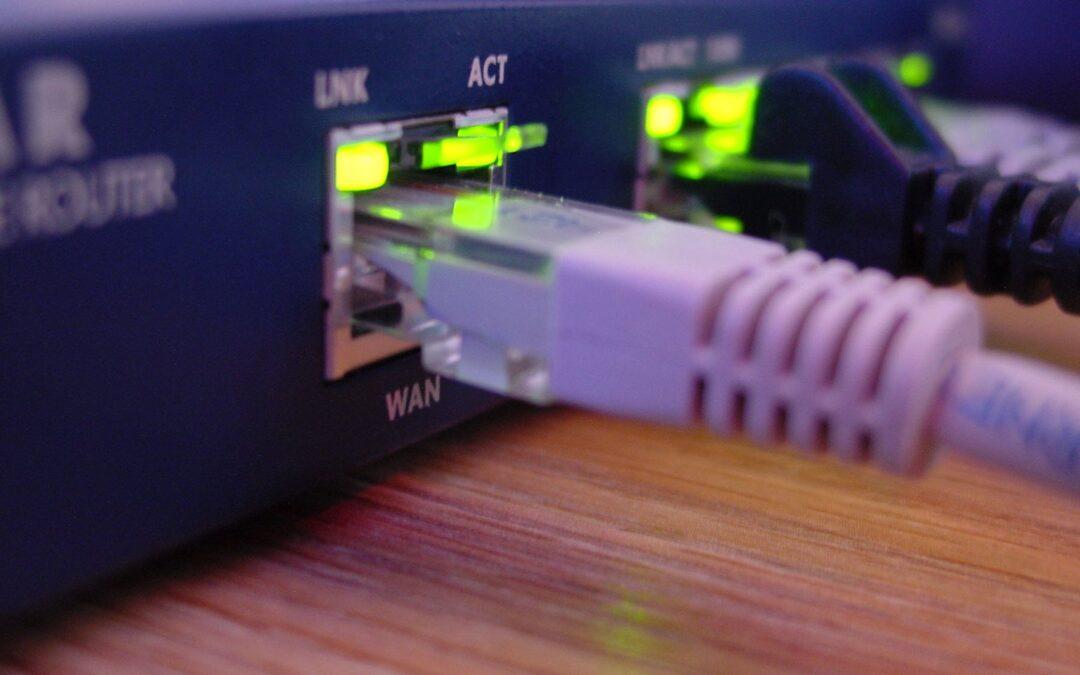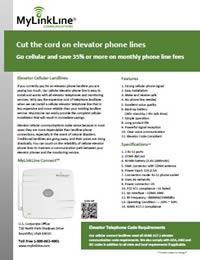The costs of transitioning an elevator telephone landline to a VoIP elevator phone line | Exploring the pros and cons, and cost-effective cellular alternatives
VoIP Elevator Phone Line for Emergency Communications
While VoIP Elevator Phone Lines can offer cost-saving benefits by eliminating the need for conventional landlines, it’s crucial to acknowledge that VoIP is not a universally applicable solution. Certain circumstances may render it non-code compliant, and elevator phones fall into this category. Ensuring compliance with elevator code requirements is of utmost importance to mitigate potential liabilities for building owners.
Elevator phones are subject to specific safety and regulatory standards to guarantee the safety of passengers in case of emergencies or entrapments. Traditional landlines have been a reliable and well-established technology for this purpose, but the transition to a VoIP Elevator Phone Line requires careful consideration and adherence to relevant codes.
To ensure code compliance and minimize liability, it is imperative to set up VoIP elevator phone line in accordance with the prescribed elevator code requirements. This may involve implementing specific features, such as location tracking, call prioritization, and ensuring uninterrupted communication during power outages through UPS battery backups. Additionally, the network infrastructure must be robust, reliable, and meet the necessary security measures to protect sensitive communication data.
Building owners, elevator contractors, and IT professionals must work together to design and implement a VoIP elevator phone line that complies with all relevant codes and regulations. Regular testing and maintenance of the system are essential to ensure it remains reliable and compliant over time.
By approaching the integration of a VoIP elevator phone line with caution and attention to code compliance, building owners can leverage the advantages of this modern communication solution while upholding the safety and security standards required for elevator systems.
Why you should be looking to replace conventional telephone landlines:
The traditional copper landline, which has been a cornerstone of communication for decades, is becoming obsolete. The PSTN (public switched telephone network), built on copper landline technology and responsible for providing phone services to businesses in the USA, is now being phased out.
According to FCC Order 19-72A1, all landlines in the United States must be replaced with alternative services by August 2, 2022. As a result, the nation’s copper line infrastructure is being actively replaced by a more efficient IP-based network.
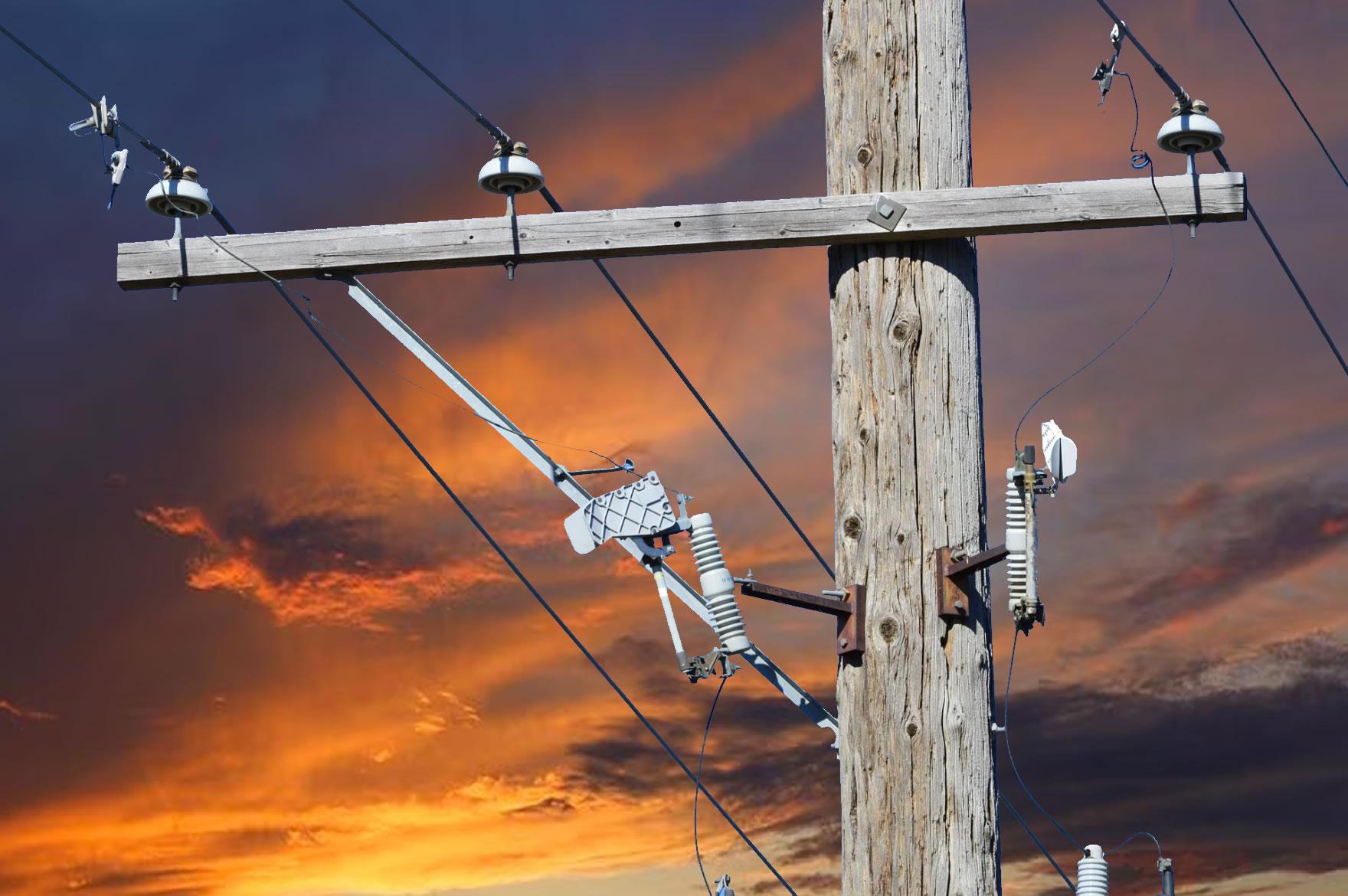
Due to this mandate, carriers are no longer obligated to offer or support traditional landline services. Consequently, there have been significant price increases, with some reaching as high as 60-100%. Many customers have received notices that their conventional old telephone landline service will soon become unavailable. This is the carrier’s way of encouraging customers to transition away from outdated technology.
The use of traditional elevator telephone landlines faces a critical decision point. Building owners and users must now choose between continuing to pay higher fees for traditional dedicated phone lines or switching to a more advanced and cost-effective communications solution. The transition away from traditional copper landlines marks a significant shift in the telecommunications landscape and emphasizes the need for businesses to adapt to the changing technology.
Approximate VoIP Elevator Phone Line Setup and Installation Costs:

VOIP Elevator Phones
A building owner will need to purchase and install a VoIP phone: To ensure seamless communication and avoid the challenges posed by inconsistent dual-tone multifrequency signals, the implementation of a VoIP phone line in elevator is essential. These phones are particularly crucial when attempting to access information from a dialer within a specific elevator or making calls back into it.
The VoIP elevator phone may need to be installed by your elevator company if built into the car operating panel. Failing to comply with this requirement can lead to an unsuccessful elevator inspection and the incurring of reinspection fees.
One of the primary concerns regarding the use of a VoIP elevator phone line is call location tracking. With VoIP technology, it becomes challenging for monitoring parties to accurately identify the location of an entrapped passenger and determine precisely which elevator cab they are calling from. This information, as stipulated by elevator codes, is crucial for prompt and effective assistance.
Non-Proprietary
Viking E-1600-IP Red
VoIP Emergency Phone
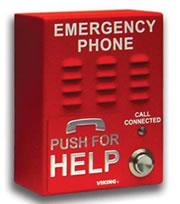
It is crucial to note that reinspection fees can amount to over $1,500 per elevator. Therefore, it is imperative not to compromise on the proper setup of VoIP elevator phone lines to avoid any additional expenses. Investing in a reliable and compliant VoIP system ensures the safety and efficiency of elevator communication for both passengers and operators.
Important: Beware of Proprietary Elevator Telephone Equipment
It’s important to be cautious when dealing with certain elevator phone equipment that is manufactured by OEMs (original equipment manufacturers) in a proprietary manner. This means that the equipment is solely produced, serviced, and contains mechanically proprietary components by the OEMs themselves.
This situation presents significant challenges for building owners and managers. Other companies are unable to work on such proprietary equipment due to restricted access to the necessary aftermarket tools and diagnostic software required for effective troubleshooting, reprogramming, maintenance, and repairs.
As a result, customers who opt for the OEMs’ preferred phone equipment at a discounted rate may find themselves locked into using their proprietary system for an extended period. This lack of flexibility can lead to limited options and reduced control over operations, potentially resulting in higher costs. Unfortunately, these hidden expenses associated with proprietary equipment are often overlooked during the initial purchase decision.
At MyLinkLine, we prioritize our client’s long-term interests by exclusively using non-proprietary elevator phone equipment with a proven track record of durability, reliability, and ease of service. Our approach ensures that you have all the information needed to make the best decision for your specific needs. Trust the MyLinkLine way for reliable and flexible elevator telephone solutions.
VoIP Internet Router
To ensure seamless and reliable VoIP elevator phone line service, it is imperative to acquire and set up a specialized router capable of handling critical communication needs. Specifically designed to cater to VoIP elevator phone line requirements, this router should have configurable features to optimize performance. One essential feature to look for is packet prioritization, which plays a crucial role in managing network traffic. By assigning higher priority to voice traffic, the router ensures that VoIP communications receive preferential treatment over other data on the network.
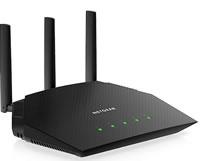
This prioritization is vital because voice traffic demands consistent and low-latency data delivery to maintain clear and uninterrupted conversations. Additionally, the router should be capable of providing sufficient bandwidth to support VoIP operations effectively. Voice data requires more bandwidth than standard data, and a robust router ensures that there is ample capacity to accommodate the communication demands of the VoIP elevator phone line system.
Purchase a Dedicated Internet Connection to Ensure Adequate Bandwidth for VoIP Elevator Phone Line

It is crucial to have your IT professional verify that the dedicated VoIP elevator phone line network possesses sufficient bandwidth to function optimally. Inadequate bandwidth can lead to various issues, especially with call quality, particularly during peak usage periods or in locations with weak internet signals.
A robust and stable internet connection with adequate bandwidth is essential for supporting clear and uninterrupted communication through the VoIP elevator phone line system. Insufficient bandwidth may cause fluctuations in call quality, leading to dropped calls, delays, or distorted audio. This becomes particularly noticeable during times when the network experiences high traffic, such as busy office hours or when multiple people are using the network simultaneously.
To ensure smooth and reliable operation, your IT professional will assess the network’s bandwidth needs by considering factors like the number of VoIP lines, the expected call volume, and any other data usage that could potentially affect the network’s performance. By optimizing the available bandwidth or upgrading to a higher-capacity internet plan, they can ensure that the VoIP elevator phone line operates within code requirements and provides dependable communication for passengers and users at all times.
Securing VoIP Communications for Elevator Phone Line
The security and privacy of a VoIP elevator phone line is critical considerations, as they can be susceptible to various threats, such as hacking, cyber-attacks, eavesdropping, and interception of sensitive information. To safeguard against these potential risks, it is highly recommended that the VoIP elevator phone line operates on a dedicated router and internet line, separate from other systems.
Isolating the VoIP elevator phone line on its own network provides an added layer of protection, reducing the likelihood of unauthorized parties gaining access to sensitive communication data. By employing a separate router and internet line, potential vulnerabilities in other systems connected to the same network are not directly linked to the VoIP system.
To ensure comprehensive security, your IT professional will conduct a thorough evaluation of your current system. They will identify potential weaknesses and implement robust security measures tailored to your specific setup. Network encryption will be employed to safeguard the integrity and confidentiality of the data transmitted over the VoIP network.
Encryption is a process that encodes the data exchanged during calls, making it unreadable to unauthorized individuals. This way, even if someone manages to intercept the communication, they won’t be able to decipher the information without the encryption key.
Additional security measures like firewall configurations, intrusion detection systems, and regular software updates will be implemented to fortify the VoIP elevator phone line against potential threats. Regular security audits will also be conducted to ensure ongoing protection and to address any emerging vulnerabilities promptly.
By following these security best practices and working closely with your IT professional, you can maintain the privacy and integrity of your VoIP elevator phone line, providing secure and uninterrupted communication for elevator users while mitigating potential risks.
Invest in a UPS Battery Backup System for VoIP Elevator Phone Line
To ensure continuous and reliable operation of the VoIP elevator phone line, it is essential to purchase and install a UPS (Uninterruptible Power Supply) battery backup system. This backup system serves as a critical safeguard against power outages, ensuring that the VoIP system remains functional even during electrical disruptions.
Without a UPS battery backup, the VoIP elevator phone line will be rendered inoperative during power failures, potentially causing communication disruptions in crucial situations.
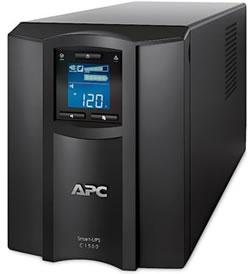
When selecting a UPS system, it is advisable to opt for one that provides sufficient standby time to support the VoIP system during extended power outages. A recommended standby time of 48 hours and a talk time of 4 hours would ensure that the elevator’s communication capabilities remain available for an extended period, allowing ample time for any necessary actions during power disruptions.
It is also essential to consider ongoing maintenance costs associated with the UPS system. The UPS batteries will need to be replaced every 2-3 years to maintain optimal performance. This regular battery replacement is a necessary investment to ensure that the UPS system continues to function effectively and provide uninterrupted power support to the VoIP elevator phone line.
By proactively implementing a UPS battery backup system and adhering to regular maintenance practices, you can safeguard the reliability of the VoIP elevator phone line, ensuring that it remains operational even during power outages, and enabling seamless communication for elevator users in any situation.
Why cellular is the best option for your elevator phone line
When it comes to elevator emergency communications, relying on cellular networks rather than Voice over Internet Protocol (VoIP) can offer several advantages. Here are some reasons why cellular emergency communications are preferred:
Costs Savings
If you are currently pay for an elevator telephone landline you are paying too much. MyLinkLine’s Cellular Connect elevator phone line is simple to install and works with all elevator telephones and monitoring services. VoIP elevator phone lines require purchasing and installing equipment. Our elevator cellular phone line set up process eliminates the need for complicated configurations or additional hardware, making cellular a hassle-free choice for quick and immediate communication need. MyLinkLine provides all equipment at no additional cost and our cellular phone lines are typically 35% – 45% less than conventional landlines or internet fees.
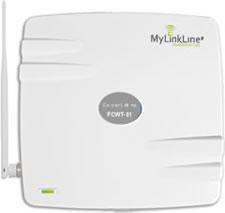
Our elevator cellular phone line also meets all applicable ADA, IBC, and ASME A17.1 code standards Get a free online quote and see how MyLinkLine can provide a complete cellular installation that will result in immediate savings.
Reliability and Safety
One of the primary advantages of cellular phone lines is their inherent reliability. Unlike VoIP elevator phone lines, which rely on an internet connection, cellular networks have specific infrastructure in place to support emergency calls. They integrate seamlessly with enhanced 911 (E911) systems, which automatically transmit caller information, including location, to emergency services. This integration ensures that emergency responders receive accurate and timely information to provide the necessary assistance.
When hurricane Sandy hit the east coast, the internet connections were down for months in certain areas where cellular continued to operate. When emergencies happen, first responders need fast and reliable communication they can count on to help ensure public demand doesn’t jam their networks. That’s why the federal government set aside the Band 14 spectrum specifically for public safety, dedicated when they need it. Cellular is the primary communication method of first responders will always get priority access across commercial spectrum bands.
Cellular Connect™
Security and Privacy
Connecting to a cellular network is absolutely safer than using a VoIP internet connection. Most internet connections are not secure because the data sent over the internet isn’t encrypted. When you use a secured internet you can encrypt your data, but it’s still less reliable and automatic than cellular signal.
Most cellular connections use a private key are made up of 256 bits in length. All data being transmitted through the network is coupled with the private key and can only be decoded by the recipient.
Quality of Service
Cellular networks are designed to prioritize voice calls, ensuring a high-quality and stable connection. VoIP calls, on the other hand, depend on the internet’s bandwidth, which can lead to fluctuations in call quality, especially during peak usage times or in areas with weak internet signals.
Future-Proofing
As technology advances, cellular networks are continuously upgraded to support higher data rates and improved reliability. By using cellular phone lines, elevator communication systems can be future-proofed, ensuring compatibility with the latest advancements.
Power Independence
Cellular devices operate on battery power, making them more resilient during power outages. MyLinkLine cellular phone line transceiver includes four hours of talk time and 48 hours of standby time. In contrast, VoIP services often rely on an internet connection and may require backup power sources, such as uninterruptible power supplies (UPS), to remain operational during power failures.
While VoIP services have their own benefits for regular communication, when it comes to emergency situations, cellular networks provide a more reliable option. Most IT professional and elevator service companies advocate using elevator cellular phone lines whenever possible. The majority of elevator passenger entrapments are caused by power outages and VoIP elevator phone line are often susceptible to disrupted communications. Cellular makes sense because in most cases they are more dependable than VoIP connections, especially in the event of natural disasters.
We use only the best cellular networks
MyLinkLine Communications has successfully secured nationwide cellular agreements with all major network providers allowing us to offer comprehensive nationwide cellular solutions.
To ensure top-notch service quality and cost-effectiveness for our elevator cellular phone lines, we have developed an exclusive network coverage scoring system. This enables us to evaluate the building’s location and determine the ideal network for that specific area. By leveraging this technology, we can provide reliable elevator cellular phone lines at the most competitive monthly rates. Request a quote now and get substantial cost savings.
Cellular Connect™
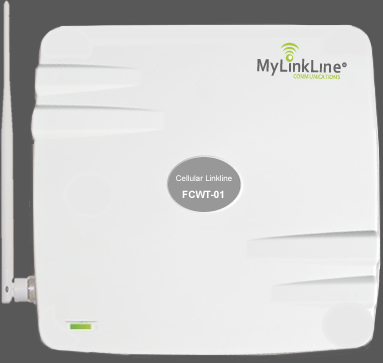
Features
- Strong cellular phone signal
- Easy installation
- Supports call waiting and forwarding
- Make and receive calls
- No phone line needed
- Excellent voice quality
- Back-up battery
(48hr stand-by / 4hr talk time) - Simple operation
- Long product life
- Powerful signal reception
- Clear voice communication
- Elevator Code Compliant
- Works with all elevator telephones and monitoring services
Specifications
- 2 RJ-11 ports
- DTMF 2’nd dial out
- Supports 1 SIM Card
- SIM card support
- NI-MH battery (3.6V,1000mAh)
- TNC Connector with GMS antenna
- Power input: 12V,0.5A
- Connection mode: RJ-11 phone socket
- Power connector: US or European
- P15 FCC compliance – UL Rated
- Air Interface – GSM 4G LTE
- RF Frequency – 800MHz/1900Mhz
- Operating Condition – : -10ºC ~ 50ºC
- ASME A17.1 Compliance

